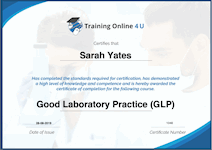Good Laboratory Practice
GLP ensures the quality and integrity of data
Trainingonline4U Ltd
Summary
- Certificate of completion - Free
Add to basket or enquire
Overview
Good Laboratory Practice (GLP) regulations were developed in the late 1970s in response to malpractice in research and development activities by pharmaceutical companies and the Clinical Research Organisations (CROs). GLP regulates the practices of scientists working on the safety testing of prospective drugs. Compliance with GLP ensures the quality and integrity of data and that a true representation of that data is presented to the regulatory authorities.
This interactive and engaging course examines the reasons why GLP is needed. It examines the regulations themselves, considers the personnel, equipment and facilities needed to conduct a GLP-compliant nonclinical laboratory study and uses scenarios to look at how these regulations apply in our own workplaces.
CPD
Course media
Resources
- GLP Information leaflet - download
Description
Introduction to GLP
- Why is GLP needed?
- What is the history of GLP?
- What is GLP?
Chapter 1 - General Provisions
-
Essential Definitions
Chapter 2 - Organisation & Personnel
- Who are personnel in a non-clinical laboratory study?
- Inspection of a Testing Facility
- Roles and Responsibilities
- Quality Assurance Unit
Chapter 3 - Facilities
- Facility Requirements
- Animal Facilities
- Animal Supply Facilities
Chapter 4 - Equipment
- Fitness for Purpose
- GLP Expectations for Maintenance and Calibration of Equipment
Chapter 5 - Testing Facilities Operations
- SOPs
- Quality Assurance
- Animal Care
Chapter 6 - Test & Control Articles
- Definitions
- Storage and Handling
- Mixtures of Articles with Carriers
Chapter 7 - Protocol for and Conduct of a Nonclinical Laboratory Study
- What is a protocol and what should it contain?
- Study Conduct
Chapter 8 - Records and Reports
- Recording and Reporting Requirements
- Archiving
- Record Retention Rules
Chapter 9 - Disqualification of Testing Facilities
- Purpose of Disqualification
- Grounds for Disqualification
- Processes and Procedures
Who is this course for?
Anyone working within clinical research.
Questions and answers
Hi, is a pdf format course? Kind Regards
Answer:Hello. No this course is not in pdf format. Once you have purchased, it will direct you to our website where you can use a one-time access code to access the course online. The course can be taken from anywhere, at any time and on any device but it does require an internet connection. The course uses interactive technology such as videos and quizzes, as well as different displays to convey the information. Hope this helps.
This was helpful.
Certificates
Certificate of completion
Digital certificate - Included
Reviews
Legal information
This course is advertised on reed.co.uk by the Course Provider, whose terms and conditions apply. Purchases are made directly from the Course Provider, and as such, content and materials are supplied by the Course Provider directly. Reed is acting as agent and not reseller in relation to this course. Reed's only responsibility is to facilitate your payment for the course. It is your responsibility to review and agree to the Course Provider's terms and conditions and satisfy yourself as to the suitability of the course you intend to purchase. Reed will not have any responsibility for the content of the course and/or associated materials.


